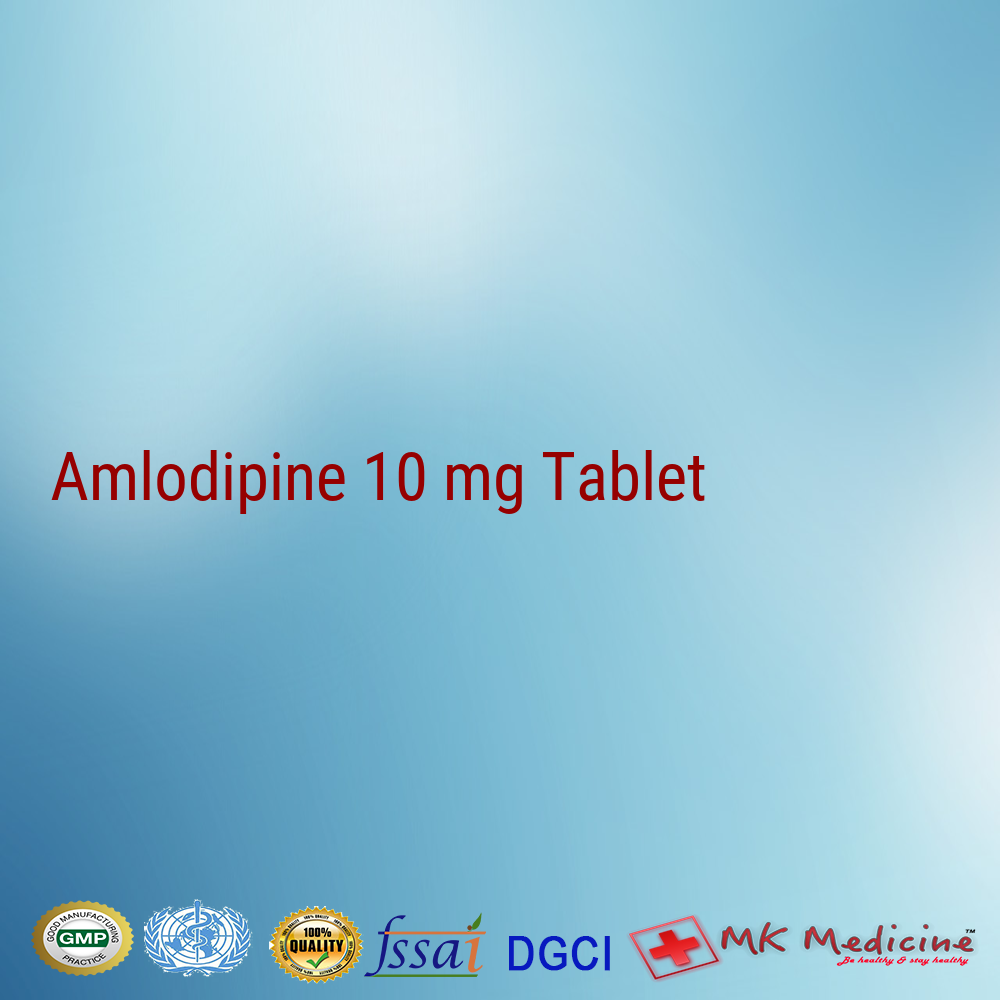Amlodipine belongs to a class of drugs called calcium channel blockers. A class of drugs refers to medications that work similarly. They are often used to treat similar conditions.
Amlodipine blocks calcium from entering certain tissues and arteries. This makes it easier for them to relax so that blood can flow more easily to your heart. This helps lower your blood pressure. It also reduces your risk for heart attack or stroke. If you’re taking amlodipine for chest pain, this reduces your risk of hospitalization and surgeries due to chest pain.
MK Medicine is a leading pcd franchise provider, contract manufacturer and hospital supplier of WHO-GMP certified Amlodipine 10 mg Tablet
People with liver problems
Amlodipine is processed by your liver. If your liver isn’t working well, more of this drug may stay in your body longer. This puts you at risk for more side effects. If you have severe liver problems, your doctor may lower your dose.
People with heart problems
If you have heart problems, such as narrowing of your arteries, this drug may increase your risk of health problems. You may have low blood pressure, worse chest pain, or a heart attack after starting or increasing your dose of amlodipine. If this happens, call your doctor or go to the emergency room right away.
Pregnant women
Amlodipine is a category C pregnancy drug. That means two things:
- Research in animals has shown adverse effects to the fetus when the mother takes the drug.
- There haven’t been enough studies done in humans to be certain how the drug might affect the fetus.
Tell your doctor if you’re pregnant or plan to become pregnant. Amlodipine should be used during pregnancy only if the potential benefit justifies the potential risk to the fetus.
Women who are breast-feeding
It isn’t known if amlodipine passes into breast milk and causes side effects in a child who is breastfed.
Talk to your doctor if you breastfeed your baby. You may need to decide whether to stop breastfeeding or stop taking this medication.
For seniors
As you age, your organs (such as your liver, heart, or kidneys) may not work as well as they did compared to when you were younger. More of this drug may stay in your body longer. This puts you at risk for more side effects.
For children
This medicine hasn’t been studied in children and shouldn’t be used in children younger than 6 years.
Allergies
Amlodipine can cause a severe allergic reaction. Symptoms include:
- trouble breathing
- swelling of your throat or tongue
- hives
Don’t take this drug again if you’ve ever had an allergic reaction to it before. Taking it a second time after an allergic reaction could be fatal.
The most common side effects that occur with amlodipine include:
- Swelling of your legs or ankles
- Tiredness or extreme sleepiness
- Stomach pain
- Nausea
- Dizziness
- Hot or warm feeling in your face (flushing)
- Irregular heart rate (arrhythmia)
- Very fast heart rate (palpitations)
- Abnormal muscle movements
- Tremors
Amlodipine is a dihydropyridine calcium antagonist (calcium ion antagonist or slow-channel blocker) that inhibits the transmembrane influx of calcium ions into vascular smooth muscle and cardiac muscle.
The precise mechanisms by which amlodipine relieves angina have not been fully delineated, but are thought to include the following:
Exertional angina: In patients with exertional angina, amlodipine besylate reduces the total peripheral resistance (afterload) against which the heart works and reduces the rate pressure product, and thus myocardial oxygen demand, at any given level of exercise.
Vasospastic angina: Amlodipine besylate has been demonstrated to block constriction and restore blood flow in coronary arteries and arterioles in response to calcium, potassium, epinephrine, serotonin, and thromboxane A2 analog in experimental animal models and in human coronary vessels in vitro. This inhibition of coronary spasm is responsible for the effectiveness of amlodipine besylate in vasospastic (Prinzmetal‚s or variant) angina.
Before taking amlodipine, tell your doctor or pharmacist if you are allergic to it; or to other dihydropyridine calcium channel blockers (such as nisoldipine, nifedipine) or if you have any other allergies. This product may contain inactive ingredients, which can cause allergic reactions or other problems. Talk to your pharmacist for more details.
Before using this medication, tell your doctor or pharmacist your medical history, especially of: a certain structural heart problem (aortic stenosis), very low blood pressure, liver disease.
This drug may make you dizzy. Do not drive, use machinery, or do any activity that requires alertness until you are sure you can perform such activities safely. Limit alcoholic beverages.
Before having surgery, tell your doctor or dentist about all the products you use (including prescription drugs, nonprescription drugs, and herbal products).
Older adults may be more sensitive to the effects of this drug, especially dizziness.
During pregnancy, this medication should be used only when clearly needed. Discuss the risks and benefits with your doctor.
This drug passes into breast milk. Consult your doctor before breast-feeding.
Important Notice:- The Database is still under development and may contain inaccuracies. It is not intended as a substitute for the expertise and judgement of your physician, pharmacist or other healthcare professional. It should not be construed to indicate that the use of any medication in any country is safe, appropriate or effective for you. Consult with your healthcare professional before taking any medication.


Atenolol 50 mg Amlodipine 5 mg Tablet